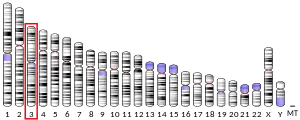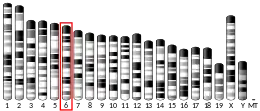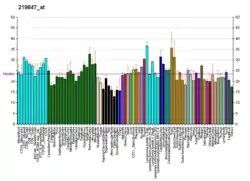HDAC11
Histone deacetylase 11 is a 39kDa histone deacetylase enzyme that in humans is encoded by the HDAC11 gene on chromosome 3 in humans and chromosome 6 in mice.[5][6]
| HDAC11 | |||||||||||||||||||||||||||||||||||||||||||||||||||
|---|---|---|---|---|---|---|---|---|---|---|---|---|---|---|---|---|---|---|---|---|---|---|---|---|---|---|---|---|---|---|---|---|---|---|---|---|---|---|---|---|---|---|---|---|---|---|---|---|---|---|---|
| Identifiers | |||||||||||||||||||||||||||||||||||||||||||||||||||
| Aliases | HDAC11, HD11, histone deacetylase 11 | ||||||||||||||||||||||||||||||||||||||||||||||||||
| External IDs | OMIM: 607226 MGI: 2385252 HomoloGene: 11743 GeneCards: HDAC11 | ||||||||||||||||||||||||||||||||||||||||||||||||||
| |||||||||||||||||||||||||||||||||||||||||||||||||||
| |||||||||||||||||||||||||||||||||||||||||||||||||||
| |||||||||||||||||||||||||||||||||||||||||||||||||||
| |||||||||||||||||||||||||||||||||||||||||||||||||||
| |||||||||||||||||||||||||||||||||||||||||||||||||||
| Wikidata | |||||||||||||||||||||||||||||||||||||||||||||||||||
| |||||||||||||||||||||||||||||||||||||||||||||||||||
It is the only Class IV HDAC since it is not highly homologous with either Rpd3 or hda1 yeast enzymes and so does not fit into either Class I or Class II.[7] It is the smallest HDAC isoform and it was first described in 2002.
Function
Histone deacetylases, such as HDAC11, control DNA expression by modifying the core histone octamers that package DNA into dense chromatin structures and repress gene expression.[supplied by OMIM][6]
HDAC11 expression is normally found in brain and testis tissue, but upregulation of HDAC11 expression has also been seen in various cancer cells.
HDAC11 has been shown to be a negative regulator of IL-10 production in antigen presenting cells. It has also been shown that inhibition of HDAC11 results in increased expression of OX40L in Hodgkin lymphoma cells.
See also
References
- GRCh38: Ensembl release 89: ENSG00000163517 - Ensembl, May 2017
- GRCm38: Ensembl release 89: ENSMUSG00000034245 - Ensembl, May 2017
- "Human PubMed Reference:". National Center for Biotechnology Information, U.S. National Library of Medicine.
- "Mouse PubMed Reference:". National Center for Biotechnology Information, U.S. National Library of Medicine.
- Gao L, Cueto MA, Asselbergs F, Atadja P (Jul 2002). "Cloning and functional characterization of HDAC11, a novel member of the human histone deacetylase family". The Journal of Biological Chemistry. 277 (28): 25748–55. doi:10.1074/jbc.M111871200. PMID 11948178. S2CID 20332854.
- "Entrez Gene: HDAC11 histone deacetylase 11".
- Yang XJ, Seto E (Mar 2008). "The Rpd3/Hda1 family of lysine deacetylases: from bacteria and yeast to mice and men". Nature Reviews Molecular Cell Biology. 9 (3): 206–18. doi:10.1038/nrm2346. PMC 2667380. PMID 18292778.
Further reading
- Verdin E, Dequiedt F, Kasler HG (May 2003). "Class II histone deacetylases: versatile regulators". Trends in Genetics. 19 (5): 286–93. doi:10.1016/S0168-9525(03)00073-8. hdl:2268/80861. PMID 12711221.
- Hartley JL, Temple GF, Brasch MA (Nov 2000). "DNA cloning using in vitro site-specific recombination". Genome Research. 10 (11): 1788–95. doi:10.1101/gr.143000. PMC 310948. PMID 11076863.
- Simpson JC, Wellenreuther R, Poustka A, Pepperkok R, Wiemann S (Sep 2000). "Systematic subcellular localization of novel proteins identified by large-scale cDNA sequencing". EMBO Reports. 1 (3): 287–92. doi:10.1093/embo-reports/kvd058. PMC 1083732. PMID 11256614.
- Wiemann S, Arlt D, Huber W, Wellenreuther R, Schleeger S, Mehrle A, Bechtel S, Sauermann M, Korf U, Pepperkok R, Sültmann H, Poustka A (Oct 2004). "From ORFeome to biology: a functional genomics pipeline". Genome Research. 14 (10B): 2136–44. doi:10.1101/gr.2576704. PMC 528930. PMID 15489336.
- Voelter-Mahlknecht S, Ho AD, Mahlknecht U (Oct 2005). "Chromosomal organization and localization of the novel class IV human histone deacetylase 11 gene". International Journal of Molecular Medicine. 16 (4): 589–98. doi:10.3892/ijmm.16.4.589 (inactive 1 August 2023). PMID 16142391.
{{cite journal}}: CS1 maint: DOI inactive as of August 2023 (link) - Rual JF, Venkatesan K, Hao T, Hirozane-Kishikawa T, Dricot A, Li N, Berriz GF, Gibbons FD, Dreze M, Ayivi-Guedehoussou N, Klitgord N, Simon C, Boxem M, Milstein S, Rosenberg J, Goldberg DS, Zhang LV, Wong SL, Franklin G, Li S, Albala JS, Lim J, Fraughton C, Llamosas E, Cevik S, Bex C, Lamesch P, Sikorski RS, Vandenhaute J, Zoghbi HY, Smolyar A, Bosak S, Sequerra R, Doucette-Stamm L, Cusick ME, Hill DE, Roth FP, Vidal M (Oct 2005). "Towards a proteome-scale map of the human protein-protein interaction network". Nature. 437 (7062): 1173–8. Bibcode:2005Natur.437.1173R. doi:10.1038/nature04209. PMID 16189514. S2CID 4427026.
- Mehrle A, Rosenfelder H, Schupp I, del Val C, Arlt D, Hahne F, Bechtel S, Simpson J, Hofmann O, Hide W, Glatting KH, Huber W, Pepperkok R, Poustka A, Wiemann S (Jan 2006). "The LIFEdb database in 2006". Nucleic Acids Research. 34 (Database issue): D415–8. doi:10.1093/nar/gkj139. PMC 1347501. PMID 16381901.
- Lindberg D, Akerström G, Westin G (Jan 2007). "Mutational analyses of WNT7A and HDAC11 as candidate tumour suppressor genes in sporadic malignant pancreatic endocrine tumours". Clinical Endocrinology. 66 (1): 110–4. doi:10.1111/j.1365-2265.2006.02694.x. PMID 17201809. S2CID 21975021.
External links
- HDAC11+protein,+human at the U.S. National Library of Medicine Medical Subject Headings (MeSH)
This article incorporates text from the United States National Library of Medicine, which is in the public domain.




